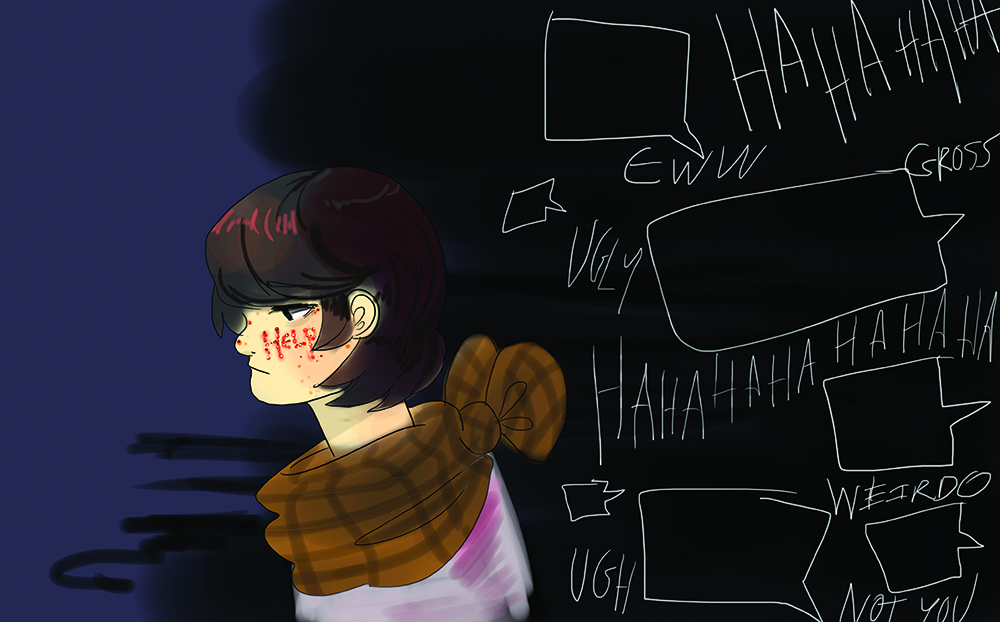Matt Dionne | Sports and Health Editor
Featured illustration: It’s time to pop the idea that acne is just a teenage issue. | Jasmine Wiradharma
Being a teenager is a difficult time filled with change and self-discovery. Aside from new hair growths and awkward voice cracks, teens have to deal with fluctuating hormones, with one very annoying side effect: acne.
While many people just brush acne off as something experienced during puberty, the issue can affect people of all ages. Approximately 80 per cent of all people between the ages of 11 and 30 have acne outbreaks at some point in their lives. The negative stigma and mental distress acne causes are extremely underestimated, which can leave people feeling isolated and ostracized, according to the Acne and Rosacea Society of Canada.
“Acne is typically dismissed as [a] cosmetic issue but it is often felt far deeper because it affects appearance and happens during a time of change—physical, emotional and social,” says Dr. Jason Rivers, president of the society.
“Acne can affect the development of self-image and assertiveness in teens—factors that are important in forming friendships and dating. Having acne has also been associated with teasing, bullying and eating disorders.
“Acne is not only a teenager’s affliction. Many adults, especially women between the ages of 20 and 40 suffer from acne to varying degrees. Up to 22 per cent of adult females have acne, while three per cent of adult males have acne,” says Dr. Benjamin Barankin, Toronto dermatologist and spokesperson for the society.
“Some teens are growing their hair to cover their face, avoiding eye contact, wearing heavy makeup to hide spots, avoiding sports like swimming if they have body acne and missing school,” adds Dr. Rivers.
The society has designated September 19 to 25 as Acne Awareness Week in Canada to raise awareness of the devastating effects of acne.
According to Dr. Barankin, the main causes of acne are genetics and hormones, but medications such as steroids, lithium and anti-seizure medications can also be contributing factors. Switching or stopping birth control can also lead to acne breakouts, as well as over washing afflicted areas.
Dr. Barankin says there are many common misconceptions about acne. “The idea that acne always goes away on its own; the idea that you just have to get through acne and that because it’s ‘only’ a skin condition and won’t kill you, that you should just grin and bear it; the idea that acne is just pimples […]; the idea that acne is from not washing your face enough or properly. While a good skin care routine [that] doesn’t overdry the skin is important, the face is not dirty and does not require harsh treatments to ‘clean it’.”
“There is a plethora of research showing a tremendous impact of acne on self-esteem, anxiety, depression and suicidality. Acne can also leave permanent scars,” he adds.
According to Dr. Barankin, adult females are more likely to be affected by acne than adult males due to hormonal reasons, such as birth control methods. During the teen years, boys usually develop acne later than girls, and tend to have a more severe form—particularly chest and back involvement.
Fortunately, acne is treatable. “The idea that nothing can be done about acne couldn’t be further from the truth. The number of treatment options for acne that are safe and effective are plentiful. We are also fortunate in Canada to generally have good access to family doctors and dermatologists for help,” he says.
For mild cases, over-the-counter medications containing benzoyl peroxide, which was developed in Canada, can help clear it up. However, for more severe cases, prescription medications such as topical gels and creams containing tretinoin or adapalene or antibiotics such as clindamycin, erythromycin, azelaic acid and dapsone may be necessary, according to Dr. Barankin.
“There are also very effective pills for more aggressive acne such as oral contraceptive therapy, antibiotic pills—typically in the tetracycline family—or isotretinoin.
“Your family doctor or dermatologist can help you best determine how to manage your skin to clear it quickly, affordably and to minimize and prevent scarring,” he adds.


